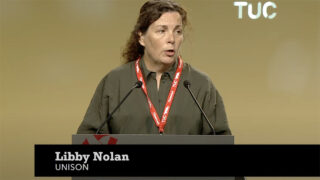As households struggle with austerity, a new report for UNISON, the UK’s largest union, finds an out-of-control water industry that is enjoying high profit margins while hitting consumers with spiralling bills.
The report, written for the union by the New Policy Institute, reveals that water charges have been outstripping earnings since long before the recession.
Over the past 10 years, bills have risen more than twice as fast as earnings. They’ve also outstripped inflation – rising threefold since privatisation in 1989, while inflation has doubled.
The report also finds that water companies – many of which are now owned by notoriously flighty private equity companies – are posting huge profits. Many have also run up heavy debts, despite their debts being written off upon privatisation.
The union is calling on the government to instigate a root and branch review of the water industry to make sure it is being run in the public interest.
Dave Prentis, UNISON general secretary said: “This private monopoly is the worst of both worlds. Since privatisation, private equity firms have swooped in to grab a lucrative slice of the water industry pie. But households, taxpayers and employees are losing out.
“The time has come to think again, with all options on the table. We need a root and branch review to make sure the industry is run in the interests of consumers not profits.”
Dr Peter Kenway, director of the New Policy Institute and report co-author, said: “The combination of opaque ownership, steady price rises and growing financial weakness should not be tolerated in an industry like water that is obviously too important to fail.
“Our report shows that the industry in England has big questions to answer about the deal it is offering consumers and taxpayers. It is time the government starting asking them.”
The report’s key findings include:
- Immediately after privatisation, most water companies were listed on the stock exchange. Now these representatives of ‘popular capitalism’ are down to four in number, with most water companies in the hands of private equity consortia, often foreign owned;
- 30% of an average household bill – more than £100 a year – goes on profit. This compares with 9% in the energy sector;
- In the last 10 years water bills have risen by 64%, compared with 28% for average earnings. If the average bill had done no more than keep up with earnings, it would now be £71 a year lower;
- There is no competition in the water industry. If prices rise, it’s on the say-so of the industry regulator. There is nothing inevitable about rising water bills: back in 1999 the regulator decided that bills should fall, by 10%;
- The industry has an ever-growing appetite for debt: although all debt was written off by the government at privatisation, debt levels rose fourfold since the late 1990s;
- Despite high profit margins and rising prices, one water company (Thames) has had to turn to government for support in order to finance new investment.
For a copy of the report please call the UNISON press office.







